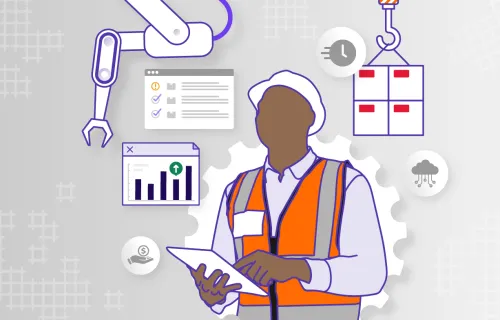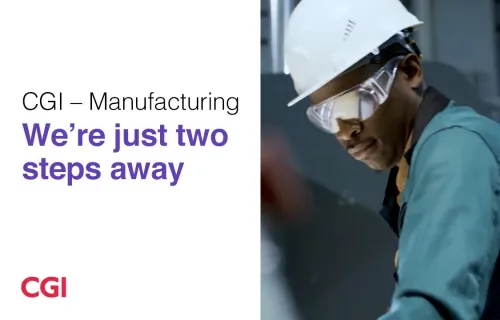Even against a backdrop of geopolitical shifts, climate change and economic uncertainty, as a global society, we are brimming with possibilities and opportunities. How we collaborate and usher in change, lean on technology to drive outcomes, while remaining human-focused during this time, has the power to alter the course of global business in the foreseeable future. This was the key theme that dominated Hannover Messe 2025—the world’s leading trade fair for industrial technology.
Canada: the official partner country
As the official partner country for Hannover Messe 2025, Canada took center stage. CGI proudly joined 250 Canadian organizations to showcase Canada’s unique position and capabilities in seizing new cross-industry global opportunities: from data spaces and digital infrastructure to the energy transition and smart manufacturing.
Our team of over 30 experts at the event connected and engaged with clients, hosting insightful workshops and sharing some of CGI’s latest offerings. These valuable interactions provided a compelling glimpse into the core themes influencing the future of global industry and revealed key insights into the strategic direction of the manufacturing and technology sectors.
Building trusted partnerships and supply chain resilience
The importance of global collaboration emerged as a clear foundational element for future success. Amid increasingly complex geopolitical and economic landscapes, trusted international partnerships have become not only advantageous but essential.
With Canada and Germany’s mature synergies, Hannover Messe demonstrated how strong bilateral relationships can foster innovation, resilience and long-term economic growth. At the same time, collaborative data spaces, such as Catena-X presented by CGI, will also play a central role in facilitating secure and efficient information sharing among global partners to enhance cross-border innovation and supply chain resilience.
Powering industry with AI
Unsurprisingly, artificial intelligence (AI) was a key focus during the event, particularly in relation to how digital twin technologies are evolving toward what CGI refers to as “digital triplets”—intelligent, dynamic and responsive decision-making systems. These advanced models do more than simulate scenarios; they actively predict, optimize and adapt based on real-time data, particularly in regulated sectors such as life sciences and manufacturing.
AI-powered digital twins were highlighted across multiple applications, including enabling an AI-powered hydrogen economy, streamlining drug development, optimizing complex production lines, and ensuring robust regulatory traceability and compliance.
Connecting the shop floor to strategy with MES
Manufacturing Execution Systems (MES) emerged as a critical technology for orchestrating real-time visibility, agility and responsiveness in modern manufacturing environments. There was a strong emphasis placed on MES integration with AI, robotics, digital twins, and cloud technologies.
MES systems have transformed from having simple compliance and tracking functionalities to now enabling real-time adaptability, enhanced quality control, and more efficient technology transfer from research and development to commercial production.
Securing the convergence of OT and IT
At Hannover Messe, security for operational technology (OT) and information technology (IT) was a key focus. The event underscored the escalating cybersecurity threats facing interconnected OT environments and emphasized the necessity for unified strategies that integrate IT and OT. Strong governance frameworks, proactive threat detection measures, and a cybersecurity-conscious organizational culture were deemed vital for ensuring resilience and protecting critical systems from cyber threats.
Fueling the future with hydrogen
Hannover Messe also highlighted significant advancements within the hydrogen economy, illustrating its growing importance at the intersection of manufacturing and green energy initiatives. Innovative solutions presented by leading companies, including Bosch and Siemens, demonstrated efficient production of low carbon, "green" hydrogen.
CGI AgileDX technology will be integral for managing hydrogen production processes, supply chain accounting, and certification tracking. The event emphasized the potential of AI-driven automation and robotics to optimize hydrogen technologies, significantly enhancing sustainable manufacturing practices and cleaner logistics and transportation.
Becoming adaptive, intelligent and human-centered
In today’s interconnected world, the lines between industries have blurred, increasing the complexity of supply chains and the digital ecosystems that support them. Having the right systems integration in place, a robust data strategy, and the right security protocols are critical. These key ingredients make it possible to gain the true benefits of advanced technologies such as AI.
With the right digital infrastructure, organizations can ensure a continuous flow of essential goods and services while supporting sustainable and efficient operations and positioning themselves to thrive in an ever-changing global landscape. The act of balancing technology with broader societal values and outcomes will also be crucial to upholding citizen supply chain ecosystems, fundamental to safeguarding citizen well-being and building stable and robust economies.
Hannover Messe reinforced that the future depends on creating solutions that deliver tangible, meaningful outcomes to communities, customers and citizens, and the workforce. Here are our recommendations for navigating this rapidly evolving landscape:
- Prioritize global collaboration frameworks: Building and nurturing international partnerships will become crucial in navigating future uncertainties. Embrace collaborative data spaces to enhance transparency, security, and innovation capacity across borders.
- Integrate advanced AI solutions strategically: Organizations should proactively incorporate intelligent systems like digital triplets into operational strategies, particularly in highly regulated environments. This integration promises improved decision-making, operational efficiency, and proactive compliance management.
- Advance holistic approaches to technological implementation: Move beyond siloed digital investments; prioritize cohesive ecosystems where robotics, MES, and AI systems integrate seamlessly, enabling rapid adaptation to market shifts and innovation requirements.
- Develop robust cybersecurity and governance practices: As digital interconnections expand, reinforce IT-OT security strategies through strong governance frameworks, proactive threat detection, and a cultivated culture of cybersecurity awareness throughout organizations.
- Emphasize human-centered technology and ethical frameworks: Balance rapid technological advancement with responsible innovation practices by embedding ethical considerations, foresight and systems thinking into every phase of technological adoption.
Hannover Messe 2025 clearly signaled that the future of industry will hinge on a balanced and thoughtful integration of technology, global cooperation, and human-centric values. As we move forward, the emphasis must remain on leveraging innovation not only for competitive advantage but to drive meaningful outcomes for society as a whole.




